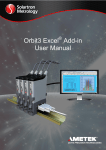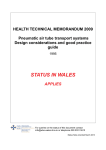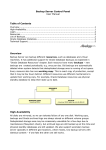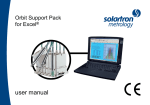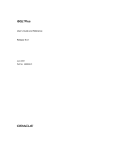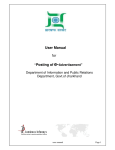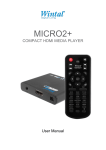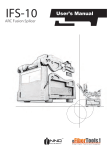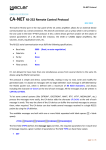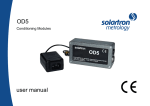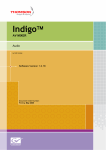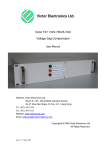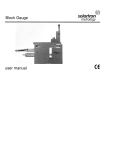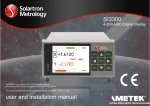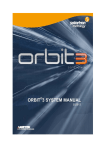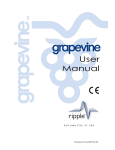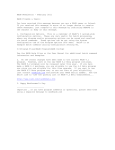Download SI5500 - User Manual
Transcript
SI5500 - User Manual User Manual SI5500 503147 Issue 1 User Manual SI5500 503147 Issue 1 GENERAL TRADEMARKS AND COPYRIGHTS Information in this document is subject to change without notice. No part of this document may be reproduced or transmitted in any form or by means, electronic or mechanical, for any purpose, without the express permission of Solartron Metrology. © 2012 Solartron Metrology Ltd. All rights reserved. Microsoft®, Windows®XP, Windows®Vista, Windows®7, Excel®, VBA and VB are registered trademarks or trademarks of Microsoft Corporation in the United States and/or other countries. Orbit® is a registered trademark of Solartron Metrology Ltd CONTACT INFORMATION For updated information, troubleshooting guide and to see our full range of products, visit our website: http://www.solartronmetrology.com SI5500 User Manual 503147 ISSUE 1 3 of 53 TABLE OF CONTENTS 1 INTRODUCTION ................................................................................................................................................................................... 7 2 SCOPE .................................................................................................................................................................................................. 7 3 NAVIGATE THIS DOCUMENT ............................................................................................................................................................. 7 4 SAFETY SUMMARY ............................................................................................................................................................................. 8 5 GLOSSARY OF TERMS AND BASIC SYSTEM INFORMATION ........................................................................................................ 9 5.1 TERMS ASSOCIATED WITH SI5500 Read out ................................................................................................................................ 9 6 ELECTRICAL INSTALLATION........................................................................................................................................................... 11 7 DISPLAY AND KEYPAD .................................................................................................................................................................... 12 7.1 OPERATE SCREEN......................................................................................................................................................................... 12 7.2 Switching to the single channel configuration for the selected channel................................................................................... 18 7.3 Keypad functionality in single channel or multi channel configuration .................................................................................... 18 7.4 GAUGING Mode Screen.................................................................................................................................................................. 19 7.5 AUTOSENSE mode SCREEN ......................................................................................................................................................... 20 8 8.1 MENU SCREEN .................................................................................................................................................................................. 21 SetUp Menu ..................................................................................................................................................................................... 22 SI5500 User Manual 503147 ISSUE 1 4 of 53 8.2 Display Configuration Menu .......................................................................................................................................................... 23 8.3 Probes Menu ................................................................................................................................................................................... 24 8.4 computed measurement................................................................................................................................................................. 25 8.5 Measurement mode ........................................................................................................................................................................ 28 8.6 Preset/Limits Menu ......................................................................................................................................................................... 29 8.7 Input/Output Menu .......................................................................................................................................................................... 30 8.7.1 Pin Details of Discrete Outputs ............................................................................................................................................... 31 8.7.2 Pin Details of Discrete Inputs .................................................................................................................................................. 31 8.8 PRINT Options................................................................................................................................................................................. 33 8.8.1 PRINT FORMAT ..................................................................................................................................................................... 35 8.9 Serial Port Menu.............................................................................................................................................................................. 38 8.10 Advanced Measurement Mode Menu......................................................................................................................................... 39 8.10.1 PEAK MODE ....................................................................................................................................................................... 41 8.11 Utilities menu ............................................................................................................................................................................... 42 8.11.1 LOGGING SETTINGS ......................................................................................................................................................... 43 9 8.11.2 SCREEN SETTINGS ........................................................................................................................................................... 45 8.11.3 ABOUT ................................................................................................................................................................................ 45 SETTING UP PROBES ....................................................................................................................................................................... 46 9.1 setup steps before Starting measurement ................................................................................................................................... 47 10 SERIAL COMMANDS ...................................................................................................................................................................... 49 SI5500 User Manual 503147 ISSUE 1 5 of 53 11 MEASUREMENT AND TIMING INFORMATION ............................................................................................................................. 52 12 RETURN OF GOODS....................................................................................................................................................................... 53 SI5500 User Manual 503147 ISSUE 1 6 of 53 1 INTRODUCTION This manual specifically caters for the SI5500 read out with Orbit Interface. 2 SCOPE The SI5500 read out can interface up to 31 Orbit Sensors and communicates through Orbit Serial Protocol (via Orbit Interface). It can interface with Orbit Digital Probes, Linear Encoders and Encoder Input Modules. The readings from the sensors are displayed on the front panel LCD display. SI5500 includes a unique feature of configuring user defined formulas/expressions for each of the measurement channel. A maximum of 31 measurement channels are supported. The read out can be configured through a 9-button keypad (3x3). Basic Input Output is provided by discrete lines. A RS232 serial interface is provided for printing the current readings. 3 NAVIGATE THIS DOCUMENT This is a large document, to aid electronic navigating the document; the following Navigation tip may be useful: It is often necessary to jump to another item and then go back to where you jumped from. This can be done in Adobe Reader by using the ‘Previous Page View’ button: 'Previous Page View' Button Other PDF readers will have a similar 'Previous Page View' option. SI5500 User Manual Revision A 7 4 SAFETY SUMMARY WARNING statements identify conditions or Warnings and Cautions practices that could result in personal injury or loss of life. Warning: Do not operate in an explosive atmosphere. CAUTION statements identify conditions or practices that could result in damage to the equipment or other property Symbols in this manual Warning: this equipment is not intended for safety critical applications Warning: Do not operate without covers Warning: do not exceed maximum ratings as specified in this document under individual modules. Indicates cautionary or other information Caution: Low Voltage This equipment operates below the SELV and is therefore outside the scope of the Low Voltage Directive Service and Repair CAUTION: This equipment contains no user serviceable parts. Return to supplier for all service and repair All of the Products are CE marked and comply with Low Voltage Directive (1997) standards. SI5500 User Manual Revision A 8 5 GLOSSARY OF TERMS AND BASIC SYSTEM INFORMATION 5.1 TERMS ASSOCIATED WITH SI5500 READ OUT Display The Liquid Crystal Display mounted on the front panel of the read out providing displayed information Keypad The 9-button keypad (3x3) mounted on the front panel of the read out allowing functional and menu navigation Discrete Inputs Digital lines into the read out which allows remote control of certain parameters/functionalities Discrete Outputs Digital lines output from read out that can be used to drive external loads. These can be with either NPN or PNP configuration Serial Interface This is a RS232 bus that is used to print the reading in ASCII format (as defined in this manual). Digital Probe This is a standard Solartron product that can be connected to the read out through Orbit Interface. EIM Encoder Input Module – A standard Solartron product that is used to interface with rotary encoders and can be read through Orbit Interface. Linear Encoder (LE) Highly accurate optical gauge that can be read out through Orbit Interface. SI5500 User Manual Revision A 9 Measurement Mode This information represents the current measurement mode of the channel. It can take the values of ABS(Absolute), TARE(ZERO), PRE(Preset) ABS(Absolute) – In this mode the displayed reading is same as the current absolute reading. TARE(ZERO) – In this mode the displayed reading is referenced to a “Zero” value. PRE(Preset) – In this mode the displayed reading is referenced to a user defined value. Operation Mode This information represents the mode in which the measurement channel is operating. It can take the values of TRACK, PEAK+, PEAK-. TRACK – Tracks the current reading of the measurement channel PEAK+ – Tracks the maximum value of the measurement channel PEAK- – Tracks the minimum value of the measurement channel Sensor/Orbit Sensor This refers to Orbit Digital Sensor from Solartron. It can be one of Digital Probe or Linear Encoder or EIM sensor module. SI5500 User Manual Revision A 10 6 ELECTRICAL INSTALLATION This section describes how to connect the unit. I/O Connector Refer to Discrete Lines section for pin details and input/output schematic details RS232 COMM Connector Refer to RS232 section for pin details 24V DC Input Connect the DC power adapter supplied as an accessory along with the read out. Orbit Communication Interface Ports Connect one end of the RS485 cable to one of the ports and the other end to the Orbit network. Orbit Network Stack Orbit Digital Probes of up to 31 sensors can be connected together. SI5500 read out supports interface of DP probes (Spring Push/Pneumatic), Linear Encoders and Encoder Input Modules. SI5500 User Manual Revision A 11 7 DISPLAY AND KEYPAD SI5500 operates in four modes of display namely: OPERATE SCREEN, MENU SCREEN, GAUGING SCREEN and AUTOSENSE SCREEN 7.1 OPERATE SCREEN The calculated readings are displayed in this mode. The operate screen can be of Single Channel Bar Display, Dual Channel Bar Display, 4-Channel Bar Display, 8-Channel Bar Display, 16-Channel Bar Display, 8-Channel Text Display, 16-Channel Text Display. User can select the required type of display through “Display Configuration Menu”. In the multi-channel configuration, user can scroll through the required set of channels using and arrow keys. The scrolling is not possible in single channel configuration. • Dual Channel Display Configuration This mode displays two consecutive channel readings in bar panel mode. The blue cursor on top of the bar indicates the current selected channel. The limits and the formula configured for the measurement channel will be missing on the display. User has to switch to Singe Channel Display Configuration for getting complete information about the measurement channel. SI5500 User Manual Revision A 12 • 4-Channel Display Configuration This mode displays 4 consecutive channel readings in bar panel mode. The blue cursor on top of the bar indicates the current selected channel. NOTE that the resolution of max/min range values is limited to 3 decimal point resolution due to constraint in the available display area. User can switch over to Single Channel Display Configuration for getting complete information about the measurement channel. • 8-Channel Display Configuration This mode displays 8 consecutive channel readings in bar panel mode. The blue cursor on top of the bar indicates the current selected channel. The resolution of max/min range values is limited to 3 decimal points only due to constraint in the available display area. User can switch over to Single Channel Display Configuration for getting complete information about the measurement channel. The measurement mode and channel operation modes are abbreviated as a single text in this mode. Below are the abbreviated values: • TR_AB – Operation mode is TRACK, Measurement mode is ABS • TR_ZE – Operation mode is TRACK, Measurement mode is ZERO • TR_PR – Operation mode is TRACK, Measurement mode is PRESET • P+_AB – Operation mode is PEAK+, Measurement mode is ABS • P+_ZE – Operation mode is PEAK+, Measurement mode is ZERO • P+_PR – Operation mode is PEAK+, Measurement mode is PRESET SI5500 User Manual Revision A 13 • • • • P-_AB – Operation mode is PEAK-, Measurement mode is ABS P-_ZE – Operation mode is PEAK-, Measurement mode is ZERO P-_PR – Operation mode is PEAK-, Measurement mode is PRESET 16-Channel Bar Display Configuration This mode displays the 16 consecutive channel readings in bar mode. The blue cursor on top of the bar indicates the current selected channel. NOTE that in this mode the readings and no other information related to the measurement channel is displayed. The reading is indicated only through the bar fill according to the current reading. This mode can be mainly used to find out which channels are out of limits/range. User can switch to Single Channel Configuration for getting the complete information about that channel. SI5500 User Manual Revision A 14 • 8-Channel Text mode configuration This mode displays the 8 consecutive channel readings in text mode. The blue cursor on left of the channel reading indicates the selected channel. User can switch to Single Channel Configuration for getting the complete information about that channel. SI5500 User Manual Revision A 15 • 16-Channel Text Mode Configuration This mode displays the 16 consecutive channel readings in text mode. The blue cursor on left of the channel reading indicates the selected channel. User can switch to Single Channel Configuration for getting the complete information about that channel. SI5500 User Manual Revision A 16 • Single channel configuration This mode displays all the properties of the measurement channel. User can switch to this mode to get all the required information of the selected channel. Channel Number varies from: C1 to C31 Configured Expression/Formula Measurement Mode: Can take values TRACK, PEAK+, PEAK- Operation Mode: Can take values ABS, TARE, PRE Calculated Reading Units of measure: Can take values mm, inch, deg, rad Upper and lower limit values NOTE: 1. If any one of the sensor/multiple sensors used in the formula is in OverRange/UnderRange condition, then an “ERROR” status is displayed in RED color instead of the current reading. The bar will be drawn with full scale in RED color. 2. If any of the sensors is not connected or not notified, then an “ERROR” status will be displayed for all the channels using that particular sensor in their formula. The bar will be drawn with full scale in RED color. 3. OSError: This error occurs when one or more Linear Sensors used in the formula for the corresponding channel reports “OverSpeed Error”. When this error occurs the bar is drawn with full scale in RED color. To reset this error, select the channel (in case of multi-channel configuration scroll the cursor to that channel) and then press ZERO key. It will reset the error and note that the reading from Linear Sensor is automatically re-zeroed. However it will not re-adjust (or re-Zero) the displayed reading if the channel is in ZERO mode. This operation has to be explicitly performed by the user through ZERO key. SI5500 User Manual Revision A 17 7.2 SWITCHING TO THE SINGLE CHANNEL CONFIGURATION FOR THE SELECTED CHANNEL To switch to single channel mode from any multi-channel configuration below steps has to be followed: • Use and arrow keys in the multi-channel configuration to select the required channel. • Press ENTER key to display the selected channel in single channel configuration mode. • To go back to the previous multi-channel display configuration, press ENTER key again. 7.3 KEYPAD FUNCTIONALITY IN SINGLE CHANNEL OR MULTI CHANNEL CONFIGURATION When the current display is of Single Channel or Multi-channel configuration mode, the metrology functions are performed through keypad buttons. The functionality of each key is described in the table below: KEY MENU Arrow Key Arrow Key PRINT Key Arrow Key ENTER Key Arrow Key ZERO Key PEAK/TRACK Key SI5500 User Manual DESCRIPTION Switches to Set Up MENU Screen. Enables PRESET on the selected channel/on all channel depending on “ZERO/PRESET all” setting in “Display Configuration” menu. Performs PEAK RESET on the current channel. Continuous press of more than 1 second will perform PEAK RESET on all the channels. Prints the reading according to the mode selected. Refer to the PRINT Options section for information on PRINT options configuration Scrolls to the previous channel when the display is in multi-channel configuration. Hold the key for more than 300ms for a continuous scroll to the previous channels. No operation in single channel configuration. Switches to single channel configuration for the selected channel from multi-channel configuration. An ENTER key press again will switch back to the multi-channel configuration. NOTE THAT when single channel configuration is selected through “Display Configuration” MENU Screen, there is no functionality for ENTER key. Scrolls to the next channel when display is in multi-channel configuration. Hold the key for more than 300ms for a continuous scroll to the next subsequent channels. No operation in single channel configuration. Perform the ZERO operation on the current selected channel or on all channels depending on “ZERO/PRESET all” setting in “Display Configuration” menu. Changes the operation mode between PEAK+, PEAK- and TRACK on the selected channel. Revision A 18 7.4 GAUGING MODE SCREEN This screen displays the result when Gauging mode is enabled. Gauging mode is used to check if all the selected number of channels is within limits. The count of channels to be used for gauging mode can be configured through “Advanced Measurement Mode” menu screen. If all the channels selected for scanning are within limits, then “PASS” status is displayed. If one or more number of channels is outside limits, then “FAIL” status is displayed. User can select “Scan” option to display the channel in Single Channel Configuration mode. and arrow keys can be used to scroll through the different channels. This mode is called as STATIC mode. NOTE THAT PRESET, PEAK/TRACK and PEAK RESET functionalities does not work in STATIC mode. ZERO and PEAK/TRACK key functions similar to that of Single Channel Configuration. To exit STATIC mode, use PEAK/TRACK key. “Search” option is used to display the channel/channels which are outside limits. If multiple channels are outside limits, then the first channel is displayed in single channel configuration mode for the configured amount of time. After that the display scrolls to the next channel which is out of limits. At the end, the display changes back to the result screen. The delay time for which each of the channels has to be displayed can be configured through “Advanced Measurement Mode” menu screen. If all the channels are within limits then screen with “No Faults Found” message is displayed for the configured amount of delay time and switches back to the result screen. “LOAD” option is used to enable the PRESET values for the measurement channels. If “LOAD” option is selected once again, it removes PRESET values. SI5500 User Manual Revision A 19 7.5 AUTOSENSE MODE SCREEN This screen displays the result when Autosense mode is enabled. Autosense mode is used to automatically select the channel which is within limits. The count of channels to be used for scanning can be set through Autosense Mode menu screen. When a channel is within limits, it is displayed in Single Channel Configuration mode. If none of the channel is within limits, then the status message “Probes Parked” message is displayed. NOTE: When more than one channel is within limits, the first channel is displayed in single channel configuration mode. There is no scrolling possible to switch to the next channel. The keypad functions the same as for Single Channel Configuration mode. SI5500 User Manual Revision A 20 8 MENU SCREEN The MENU screens are used to set up/configure the read out. Menu Screen can be activate through MENU key button on the keypad. The current screen is stored and displayed back when MENU Screen mode is exit. In MENU Screen mode the keypad functionality is as per the table below: DESCRIPTION KEY MENU Exits MENU Screen mode. Arrow Key Scrolls UP. Hold the key for more than 300ms to scroll UP continuously. Arrow Key Scrolls DOWN. Hold the key for more than 300ms to scroll DOWN continuously. PRINT Key No Operation. Arrow Key Scrolls to the right side. Hold the key for more than 300ms to scroll continuously. ENTER Key To select the option and also for number editing. Refer to the example below. Arrow Key Scrolls to the left side. Hold the key for more than 300ms to scroll continuously. ZERO Key Used only in Formula Edit Menu Screen. Will erase the complete formula so that the user can enter the required formula from the beginning. PEAK/TRACK Key Used only in Formula Edit Menu Screen. Acts as a backspace key. Erases a single token (operator/operand) in the formula. For e.g. Consider the formula “A+sinB” and the current cursor location is at B. Press of this key will erase “sin” token and retains the remaining tokens in the formula string. The resultant formula string will be “A+B”. Example of editing a number: There are many menu screens where number/range values are present. Below is the procedure for editing the same. Consider the number +010.00000. Key + 0 1 0 . 0 0 0 0 0 Cursor is at first position. Default position at the start. ENTER + 0 1 0 . 0 0 0 0 0 ENTER key will start edit mode. 0 1 0 . 0 0 0 0 0 UP arrow key will change the sign of the number. 0 1 0 . 0 0 0 0 0 RIGHT arrow key will change the current position to the next digit ‘0’ 0 1 0 . 0 0 0 0 0 RIGHT arrow key will change the current position to the next digit ‘1’ 0 2 0 . 0 0 0 0 0 UP arrow key will increment the number. SI5500 User Manual Revision A 21 ENTER - 0 2 0 . 0 0 0 0 0 ENTER key will stop edit mode. The final number (020.00000) will be saved and used further. 8.1 SETUP MENU The main SetUp Menu has two pages (Page1 and Page2). SetUp Menu Page 1 SetUp Menu Page 2 Display Configuration ENTER Input/Output Probes Computed Measurement PRINT Options Serial Port ENTER Measurement Mode Advanced Measurement Mode Preset/Limits Utilities Next Menu SI5500 User Manual Exit Menu Back Revision A Exit Menu 22 8.2 DISPLAY CONFIGURATION MENU Display Configuration Menu OPTIONS Display Config 1Ch, 2Ch, 4Ch, 8Ch Bar, 8Ch Txt, 16 Ch Bar, 16Ch Txt Places after DP 1, 2, 3, 4, 5 Bar Offset Bar AutoRange +000.00000 OFF, ON OFF, ON ZERO/PRESET all 1, 2, 3, 4, 5 Last Digit Step Exit Menu NOTE: The “Display Config” menu item is a list box and the options under this item can be selected through and arrow keys. The options for this menu item are listed with a comma in between the options. The same convention will be followed further in this document. All the options which are separated by a comma is a list box and can be selected through andarrow keys. “ZERO/PRESET all” menu option enables the setting of performing ZERO/PRESET operation on single channel or on all channels. Last Digit Step – Defines the minimum step resolution for the reading displayed. The displayed reading is changed only in multiples of the configured “Last Digit Step” configuration setting. For e.g. If the setting is set to ‘2’ and the reading changes from 7.5264 to 7.5267 the reading on the display is changed to 7.5266 and not 7.5267 since it is not multiple of 2. NOTE: To disable the “Last Digit Step” functionality, set it to ‘1’. SI5500 User Manual Revision A 23 8.3 PROBES MENU Sensor number: Varies from ‘A’ to ‘Z’ and from ‘a’ to ‘e’. Probes Menu – Sensor A Probe Type Direction Range Probe ID OPTIONS Orbit Retract+, Extend+123.00000 ABCDEFGHIJ Resolution 14-bit, 16-bit, 18-bit Pulses/Rev 12345 These fields are not user editable- Will be filled automatically according to the sensor Notified. NOTE: The Pulses/Rev option is valid only for EIM sensor type and will not appear for other Orbit Sensor types. The Resolution and Pulses/Rev options do not appear on start-up and will be visible if a valid probe is notified. Notify Back Next Menu Probes Menu is used for setting up the probes. To Notify a probe follow the below procedure: • • • • Select the direction type. For Spring-Push probes: it has to be set to “Retract+”, for pneumatic probes: it has to be set to “Extend-“. Select “Notify” option. An on-screen tip will also be displayed on the screen. Move the probe tip to get notified. After notify command is successful, the “Range”, “Probe ID”, “Resolution”, “Pulses/Rev” parameters gets populated according to the sensor type. NOTE: • To Notify the probe tip has to be moved such that the readings change by about 1%. After moving the probe tip, it takes about 500ms to update the data on the display. SI5500 User Manual Revision A 24 • Resolution can be changed only for DP type probes. It is also not possible to change if a sensor is in Difference Mode. Difference mode is started if MAX or MIN or DIFF math formula is applied on the particular probe. 8.4 COMPUTED MEASUREMENT SI5500 User Manual Revision A 25 Computed Measurement Menu OPTIONS Channel Nr C1, C2, C3, ……., C31 Expression MAXA Units Uni-/Bi-Polar Range User defined formula corresponding to the selected Channel Nr mm, inch, deg, rad Auto, Unipolar, Bipolar +000.000000 Exit Menu ENTER Key to edit the formula Use and arrow keys to move through the formula string. ZERO key will erase the formula completely and allows to input formula from the beginning. PEAK/TRACK works as backspace key. Use and arrow keys to scroll between the options. This screen is used to edit/enter the formula for the corresponding channel. Opr, Opd, Num, Math options provides a pop-up window containing various mathematical operators, trigonometric functions and sensor numbers (used as operands for mathematical or trigonometric functions) defined in the table below. SI5500 User Manual Revision A 26 Opr - +, -, *, /, (, ), , Exit Opd – A, B, C, D, E, F, G, H, I, J, K, L, M, N, O, P, Q, R, S, T, U, V, W, X, Y ,Z, a, b, c, d, e, Exit Num – 0, 1, 2, 3, 4, 5, 6, 7, 8, 9, Exit Math – sin, cos, tan, inlog10, inloge, log10, loge, Mx, Mn, MAX, MIN, DIFF, Exit User has to use ,, and arrow keys to scroll through the options displayed in Opr, Opd, Num, Math pop-up windows. The required option can be selected through ENTER key. The selected option is inserted at the current indexed location in the formula string. TIP: 1. It is not necessary to exit the pop-up window displayed before opening the new pop-up window. User can scroll to the next required option using and arrow keys. Whenever the next option is selected before exiting the current pop-up window it is taken care to erase the current pop-up and the new pop-up window will be displayed. For eg: If user is in “Opd” pop-up window display and wants to open “Math” pop-up window, it is not necessary to scroll through all the way to “Exit” option, close the window and then select the Math option. Instead user can use and arrow key to scroll to “Math” option and select the same to display “Math” operations pop-up window. 2. Flexibility has been provided even to scroll through the formula expression string, without closing the pop-up window displayed. User can use arrow key to scroll to the formula string and then and arrow keys to index to the required position in the formula string. 3. If a measurement channel is not used, leave the formula field blank by erasing the complete formula. This will yield a faster performance. SI5500 User Manual Revision A 27 8.5 MEASUREMENT MODE Measurement Mode Menu OPTIONS Channel Nr C1, C2, C3, ……., C31 Measure Mode TRACK, PEAK+, PEAK- Reset Mode Trigger Time(ms) Trigger Level These options are applicable only for PEAK+ and PEAK- measure mode options. It will be displayed only if the corresponding channel is in PEAK+ or PEAKmeasurement mode. Manual, Automatic 12345 +000.000000 Exit Menu NOTE: Trigger Time has to be a multiple of 20ms This menu is used to configure the measurement mode of the channel. If “Reset Mode” is set to Manual option, then the peak value is reset through arrow key. If “Reset Mode” is set to Automatic option: • • In PEAK+ mode, peak value is reset to the current reading if it goes below the configured trigger level for the configured trigger time period In PEAK- mode, peak value is reset to the current reading if it goes above the configured trigger level for the configured trigger time period SI5500 User Manual Revision A 28 8.6 PRESET/LIMITS MENU Preset/Limits Menu Channel Nr OPTIONS C1, C2, C3, ……., C31 Preset +000.00000 Upper Limit +003.00000 Lower Limit -003.00000 Exit Menu SI5500 User Manual Revision A 29 8.7 INPUT/OUTPUT MENU Input/Output – Page 1 Logic Outputs Active LOW, Active HIGH Out1 <ChNr> <Func> <C1, C2, C3, …., C31> <OK, Under, Over, None> Out2 <ChNr> <Func> <C1, C2, C3, …., C31> <OK, Under, Over, None> Out3 <ChNr> <Func> <C1, C2, C3, …., C31> <OK, Under, Over, None> Out4 <ChNr> <Func> <C1, C2, C3, …., C31> <OK, Under, Over, None> Back Next Menu Input/Output – Page 2 Out5 <ChNr> <Func> <C1, C2, C3, …., C31> <OK, Under, Over, None> Out6 <ChNr> <Func> <C1, C2, C3, …., C31> <OK, Under, Over, None> Logic Inputs Active LOW, Active HIGH Inputs Config Config1, Config2 Back SI5500 User Manual OPTIONS Exit Menu Revision A 30 SI5500 supports 6 discrete inputs and 6 discrete outputs. The discrete outputs can be mapped to any channel number through menu screen shown above. “OK” Control Function: Output is set when the reading for the associated channel is within limits. “Over” Control Function: Output is set when the reading for the associated channel is above upper limit or above max. range (OverRange condition). “Under” Control Function: Output is set when the reading for the associated channel is below lower limit or below min. range (UnderRange condition). TIP: If any output is not used, set it to “None”. 8.7.1 Pin Details of Discrete Outputs PIN No. Description 1 Out1 14 Out2 2 Out3 15 Out4 3 Out5 16 Out6 4 Isolated O/P Common 8.7.2 Pin Details of Discrete Inputs The functionality of discrete inputs depends on the “Inputs Config” type configured. Below is the table explaining the discrete inputs functionality: PIN No. 17 5 18 Config1 ZERO Edge Input type. When this input is set active, it will ZERO the current selected channel or all channels according to the ZERO/PRESET all configuration PRESET Edge Input type. When this input is set active, PRESET operation will be performed on the current selected channel or all channels according to the ZERO/PRESET all configuration PRINT For Edge Input type – It sends single PRINT data onto SI5500 User Manual Config2 ZERO Edge Input type. When this input is set active, it will ZERO the current selected channel or all channels according to the ZERO/PRESET all configuration PRESET Edge Input type. When this input is set active, PRESET operation will be performed on the current selected channel or all channels according to the ZERO/PRESET all configuration PRINT For Edge Input type – It sends single PRINT data onto Revision A 31 6 19 7 20 RS232 port. For ACTIVE Input – It sends continual PRINT stream of data onto RS232 port. LOG Starts data logging PEAK RESET Edge Input type. Performs complete PEAK RESET on all the channels PEAK TOGGLE Edge Input type. Changes the mode of the current selected channel between PEAK+/PEAK-/TRACK. Similar to giving input through PEAK/TRACK key from the keypad Isolated I/P Common RS232 port. For ACTIVE Input – It sends continual PRINT stream of data onto RS232 port. Not Used Not Used Not Used Isolated I/P Common Discrete Inputs and Outputs Schematic: External Supply 10V to 24V DC PINS – 17,5,18,6,19,7 Load (up to 500mA) PINS – 1,14,2,15,3,16 PIN - 4 PIN 20 GND Discrete Inputs Schematic Discrete Outputs Schematic SI5500 User Manual Revision A 32 8.8 PRINT OPTIONS PRINT OPTIONS Menu OPTIONS KeyPress Single, Continuous Discrete I/P Single, Continuous Print Mode This Reading, Reading+Step, All Readings Exit Menu Single PRINT will send the data onto RS232 only once. Continuous PRINT will send data onto RS232 continuously. The PRINT key or the discrete input functionality depends on the current mode in which SI5500 is operating. Below table summarizes the same: Print Mode OPERATE SCREEN This Reading Prints Current Readings of all If in SCAN mode i.e. current display Prints Current Reading of the When the unit is in displayed channels is Gauging Mode result Screen, no displayed channel within limits. “acquisition phase”, the currently stored readings SI5500 User Manual GAUGING MODE AUTOSENSE MODE Revision A PEAK MODE 33 print occurs. If there is no channel within are printed. limits, no information will be If in STATIC mode i.e. “Scan” option printed. When the unit is in “analysis phase”, the is selected through Gauging Mode result Screen, current displayed calculated result values channel reading is printed. are printed. Reading+Step Prints Current, max and min If in SCAN mode i.e. current display No Operation. readings of all the displayed is Gauging Mode result Screen, the channels display is changed to STATIC mode and the current displayed channel reading is printed. Each PRINT will advance to the next channel and prints the reading. After the last channel selected for scan is printed, the display reverts back to the first channel. No Operation. If in STATIC, each PRINT will advance to the next channel and prints the reading. After the last channel selected for scan is printed, the display reverts back to the first channel. All Readings Prints Current Reading of all Prints the current reading of all the Prints the current reading of all All the stored readings and the 31 channels channels selected for scanning. the channels selected for calculated result values scanning. are printed. This mode works only when unit is in “analysis phase”. SI5500 User Manual Revision A 34 8.8.1 PRINT FORMAT Current Readings: • x : : x x x C 1 x x x x x x x x . x . x x . x x x . x x x . x x x x x x x x x x x x x x x x x x x x x x x x . x x . x x x . x x x . x x x x . x x x x x x x . x x x . x x x . x x x x . x x x x . x x x x m i d r m n e a c g d h Limits Space Space Sign + - Units > < = ! \r \n Limits > < = ! Eg: For channel C1 with reading as +1.34815 with units as inch, within limits : + 1 . 3 4 8 1 5 i n c h = SI5500 User Manual Line Feed x x Reading Right aligned with DP set throgh "Places after DP" setting in "Display Configuration" menu Carriage Return C C Space Channel Nr (C1 to C31) In any mode the current readings of the measurement channels are printed in the format below: Revision A \r Description Above Upper Limit Below Lower Limit Within lim its Probe Error - One of the probe used in the formula is not notified or has under range/over range error \n 35 • Current, Max, Min Readings: C x C x x : : + - . x x x x x x x x x x x . x x x x . x x x x x x x x x x x x . x x x x . x x x x x x x x x x x x . x . x x . x x x . x x x x x x x x . x x . x x x . x x x x x x x x x x x . x x x . x x x . x x m i d r m n c h e g a d > < = ! ; + - . x x x x x x x x x x x . x x x x . x x x x x x x x x x x x . x x x x . x x x x x x x x x x x x . x . x x . x x x . x x x x x x x x . x x . x x x . x x x x x x x x x x x . x x x . x x x . x x m i d r m n c h e g a d ; + - . x x x x x x x x x x x . x x x x . x x x x x x x x x x x x . x x x x . x x x x x x x x x x x x . x . x x . x x x . x x x x x x x x . x x . x x x . x x x x x x x x x x x . x x x . x x x . x x Units m i d r Space Carriage return Line Feed Max. Reading Right aligned with DP set throgh "Places after DP" setting in "Display Configuration" menu Space Units Sign Space Max. Reading Right aligned with DP set throgh "Places after DP" setting in "Display Configuration" menu Space Sign Space Limits Units Space Reading Right aligned with DP set throgh "Places after DP" setting in "Display Configuration" menu Space Sign Space Channel Nr (C1 to C31) In any mode Current, Max, Min readings of the measurement channels are printed in the format below: m n c h e g a d Example: For Channel C12: with current reading as +1.2456, above upper limit, units as mm and with max. & min. readings as +1.8634 & -0.0003 respectively C 1 2 : + 1 . 2 4 5 6 mm > ; + 1 . 8 6 3 4 mm ; 0 . 0 0 0 3 mm SI5500 User Manual Revision A \r \n \r \n 36 • PEAK Mode Print Format: t t x x x : : Sign + - x x . x . x x . x x x . x x x . x x x x x x x x x x Line Feed n n PEAK Reading Carriage return P P Space Reading Nr The readings in the PEAK mode are printed in the below format: \r \n Eg: PEAK readings values +7.4982, +10.6290 and +9.1863 are displayed as below P n t 1 : + 7 . 4 9 8 2 \r \n P n t 2 : + 1 0 . 6 2 9 0 \r \n P n t 3 : + 9 . 1 8 6 3 \r \n The calculated result values are printed in the below format: SI5500 User Manual Revision A 37 a i a v : : g r e a g e : : : : Sign + - x x . x . x . x x Line Feed M M R A x n n e Carriage return a i a v Space Result Type M M R A Result value \r \n \r \r \r \r \n \n \n \n x x x x Eg: Max=+7.4982, Min=+7.3716, Range=+0.1266 and Average=+7.3915 x : : + 7 . 4 9 8 2 n : : + 7 . 3 7 1 6 n g e : + 0 . 1 2 6 6 e r a g e : + 7 . 3 9 1 5 8.9 SERIAL PORT MENU Serial Port Menu Baud Rate OPTIONS 1200, 2400, 4800, 9600, 19200, 38400, 57600, 115200, 187500 No of Data Bits 7, 8, 9 No of Stop Bits 0.5, 1, 1.5, 2 Parity Odd, Even, None Exit Menu Pin diagram of RS232 port: SI5500 User Manual Revision A 38 PIN 1 2 3 4 5 6 7 8 9 Description Not Used RS232 Tx RS232 Rx Not Used RS232 GND Not Used Not Used Not Used Not Used 8.10 ADVANCED MEASUREMENT MODE MENU SI5500 User Manual Revision A 39 Advanced Measurement Mode Menu OPTIONS Advanced Mode None, Gauging, Autosense, PEAK mode Exit Menu Gauging mode selected Advanced Measurement Mode Menu Menu screen when “Advanced Mode” is set to None. The other menu options get enabled according to the advanced mode selected. Autosense mode selected Advanced Measurement Mode Menu OPTIONS OPTIONS Advanced Mode None, Gauging, Autosense, PEAK mode Advanced Mode None, Gauging, Autosense, PEAK mode No. of Channels 1 to 31 No. of Channels 1 to 31 Search Delay 02000 Search Delay Exit Menu Exit Menu To switch OFF the advanced measurement mode and return back to the OPERATE SCREEN mode, select NONE. SI5500 User Manual Revision A 40 8.10.1 PEAK MODE Advanced Measurement Mode Menu OPTIONS Advanced Mode None, Gauging, Autosense, PEAK mode Channel Nr 1 to 31 No. of Readings 2 to 99 Exit Menu PEAK mode is designed to take up to 99 numbers of PEAK readings as input, analyze the same and display the calculated result values. When PEAK mode is selected, the unit enters into “acquisition phase” and the selected channel reading is displayed in single channel mode. User can set the current displayed reading as a PEAK reading through “ENTER” key press. The storage counter displayed on the screen gets incremented after a successful store of the PEAK reading. If an input reading has to be erased, the same can be done by PEAK/TRACK key press. When all the configured number of PEAK readings is input, the unit enters into “analysis phase” and the readings are analyzed and below mentioned calculated result values are displayed through a result message pop-up window: Max: Maximum PEAK reading in all the PEAK readings input Min: Minimum PEAK reading in all the PEAK readings input Range: (Max – Min) Avg: Sum of all readings/Number of readings input When the result message pop-up window is exit, all the current readings are erased and the unit is ready to take next set of input readings. User can print the stored PEAK readings and the calculated result values according to the PRINT mode settings configured. Refer to PRINT Options section for further details. SI5500 User Manual Revision A 41 8.11 UTILITIES MENU Utilities Menu This option reset all the configuration data to default values. All the probes notified information are lost and has to be notified once again. Restore Factory Settings Password Settings Logging Settings A pop-up message indicating “FACTORY SETTINGS RESTORED. System Resetting...” will be displayed. The unit will automatically reset and come up with default settings. Screen Settings About Exit Menu Password Settings Menu OPTIONS Password Enable OFF, ON Password Value 1234 Lock function Lock Menu, Lock All, Button Lock Exit Menu Lock Menu – Will lock the MENU key. A valid password has to be entered whenever MENU screens has to be opened. No password is required for other key press functionalities. Lock All – A valid password has to be entered for MENU key press. All the other keys will be disabled and does not function. Button Lock – Will lock all the keys. A valid password authentication is required for any key press. SI5500 User Manual Revision A 42 8.11.1 LOGGING SETTINGS Logging Settings – Page 1 OPTIONS Mode Standard, Start on I/P, Trig. on I/P Interval(ms) 0001000 Duration(ms) 0040000 Channel Count 1 to 31 Back Next Menu Logging Settings – Page 2 Opens a pop-up window to choose the Log Page OPTIONS Log Page Start Logging OK Stop Logging Current, Page1, Page2, Page3, Page4, Page5, Page6, Page7, Page8 Exit Print Summary OPTIONS Print Log Log Page Save Log Back Next Menu Opens a pop-up window to choose the Log Page OK Page1, Page2, Page3, Page4, Page5, Page6, Page7, Page8 Exit This menu screen allows user to configure the required logging settings. The required number of channels for logging can be selected through “Channel Count” option. NOTE THAT the “Duration” and “Interval” time values have to be multiple of 20ms. User can log up to 8 sets of data onto SI5500 User Manual Revision A 43 FLASH through selecting one of Page1 to Page8. Each “Page” is of 512KB in size and can hold up to 4K readings from each measurement channel when all the 31 channels are selected for logging. The number of readings can increase if less than 31 channels are selected for logging. The “Start Logging” option will start logging the data onto RAM and not onto FLASH. User has to save the data onto FLASH through “Save Log” option. “Print Log” and “Print Summary” options send the data through RS232 port. Log Mode Options: Standard – This mode is time triggered logging mode. In this mode the logging can be started/stopped through Start Logging/Stop Logging menu options. The logging is automatically switched OFF after the configured duration time is elapsed. Start on I/P – This mode is similar to “Standard” mode except that the logging can be started through LOG digital input only. Logging cannot be started through “Start Logging” menu option in this mode. Logging can be stopped through “Stop Logging” menu option or it is switched OFF after the configured duration time is elapsed in this mode. Refer to Pin Details of Discrete Inputs section for digital inputs pin diagram. Trig. on I/P – In this mode a snapshot of the current readings are logged whenever there is an active input on LOG digital input pin. User has to start logging through “Start Logging” menu option before logging of current readings can happen. Logging can be stopped through “Stop Logging” menu option only and automatic logging switch-OFF is not present in this mode. Refer to Pin Details of Discrete Inputs section for digital inputs pin diagram. Log Page Select Options: Current – Selects the log data stored in RAM. This option is not available in “Save Log” option. Page1 to Page8 – Selects the log data set stored in the selected FLASH page. Log Summary printed will contain the below information per channel: Number of Readings: Number of readings logged per channel Max Reading of Ch: Maximum reading Min Reading of Ch: Minimum reading Limit> Ch: Number of readings above the upper limit Limit< Ch: Number of readings below the lower limit SI5500 User Manual Revision A 44 Mean Ch: Mean of the readings StdDev Ch: Standard Deviation of the readings 8.11.2 SCREEN SETTINGS Screen Settings Contrast OPTIONS 0, 5, 10, 15, 20, 25, 30, 35, 40, 45, 50, 55, 60, 65, 70, 75, 80, 85, 90, 95, 100 Exit Menu LCD screen contrast setting can be adjusted with the provided contrast levels options. 8.11.3 ABOUT SI5500 Orbit Digital Display Firmware Version VXxxVXxx Exit Menu About Menu screen display firmware version of both MICRO1 and MICRO2. It is displayed in the format <MICRO1 Ver><MICRO2 Ver>. SI5500 User Manual Revision A 45 9 SETTING UP PROBES • • • • • After making the connections as explained in ELECTRICAL INSTALLATION section, go to SetUp Menu Page-1 through MENU Key and then select “Probes” option to enter the Probes Menu. In “Probes” menu, select the direction as Retract+ for Spring-Push type probe and as Extend- for Pneumatic type probe and select NOTIFY. The NOTIFY screen will be displayed with an on-screen tip. In the NOTIFY screen, NOTIFY option will no longer be available instead Cancel option will be available. The probe tip should be moved in such a way that the readings change by more than 1%. After the NOTIFY procedure is completed, all the parameters are populated according to the probe type. Move to the next probe through “Next Menu”. Follow the same procedure to NOTIFY all the connected probes. This completes the probes setting-up procedure. The formula for individual measurement channel can be configured through computed measurement section. SI5500 User Manual Revision A 46 Probes Menu – Sensor A Probes Menu – Sensor A SetUp Menu Page 1 Probe Type Orbit Probe Type Orbit Direction Retract+ Direction Retract+ Display Configuration Probes ENTER Range Range Probe ID Probe ID Computed Measurement Measurement Mode Preset/Limits Notify Next Menu Move the Probe Tip or Select Cancel to end Notify Back Next Menu Exit Menu Cancel Probes Menu – Sensor A Probe Type Orbit Direction Retract+ Range +10.00000 Probe ID 110FC49P05 Resolution 18-bit Notify Back Next Menu Back Next Menu NOTIFY SCREEN << On Completion of NOTIFY process >> << Move to the Next Probe >> 9.1 SETUP STEPS BEFORE STARTING MEASUREMENT After setting up the probes as described in Setting up probes section, the probe readings has to be reset to a known initial value before starting the measurement. Below procedure has to be followed in the same order as mentioned before starting the measurement: • Perform a PEAK reset on all the probes - Exit from menu screen and set the display in OPERATE screen mode to display the current readings. Hold DOWN key for 1sec to perform the PEAK reset on all the probes. Alternatively, the operation can also be performed through a discrete input. Refer to Input/Output Menu section for configuration and pin details of discrete inputs. This step will clear all the previously tracked PEAK+ or PEAK- or run-out values. NOTE: It takes 0.5sec to perform a PEAK reset on the probe if it is configured in “Difference mode” for tracking MAX/MIN/finding run-out. Wait for the required time according to the number of sensors configured in “Difference mode”. SI5500 User Manual Revision A 47 • Perform a ZERO operation - This operation will set the current reading of all the channels to Zero. Press ZERO key to perform this operation. Alternatively, the operation can also be performed through a discrete input. Refer to Input/Output Menu section for configuration and pin details of discrete inputs. Enable ZERO/Preset all setting through Display Configuration Menu to perform ZERO operation on all the channels at once. • Instead of ZERO operation, PRESET operation can be performed according to the user requirements. Press UP arrow key to add pre-defined PRESET values. Alternatively, the operation can also be performed through a discrete input. Refer to Input/Output Menu section for configuration and pin details of discrete inputs. Enable ZERO/Preset all setting through Display Configuration Menu to perform PRESET operation on all the channels at once. • User can start taking the measurements now. SI5500 User Manual Revision A 48 10 SERIAL COMMANDS SI5500 supports two serial PRINT commands named below: • SI5500 PRINT Command: This command is used to get the details of a single measurement channel or for all the measurement channels in complete format. Command bytes – ‘^’ ‘P’ ‘S’ <channel number>. Channel number varies from 0 to 30. If set to 0xFF, details of all the channels are printed. Print Data Format – SI5500 User Manual Revision A 49 : : + x x . x . x x . x x x . x x x . x x x x x x x x x x x x x x x . x x . x x x . x x x . x x x x . x x x x x x x x x x x x x . x x x . x x x x . x x x x . x x x x x x x x x x x x x x x x x x x . m m i n c h > < = ! + - x x . x . x x . x x x . x x x x x x x x . x x . x x x . x x x x x x x x x x x . x x x . x x x . x x . x x x x x x x x x x x . x x x x . x x x x x x x x x x x x . x x x x . x x x x x x x x x x + x x . x . x x . x x x . x x x . x x x x x x x x x x x x x x x . x x . x x x . x x x . x x x x . x x x x x x x x x x x x x . x x x . x x x x . x x x x . x x x x x x x x x x x x x x x x x x x . User defined formula (Upto 100 chars) Space Carriage return Line Feed Mode Space Upper Limit Right aligned with DP set throgh "Places after DP" setting in "Display Configuration" menu Space Lower Limit Right aligned with DP set throgh "Places after DP" setting in "Display Configuration" menu Space Sign Units Space Limits Space Sign Space Space Sign Channel Nr (C1 to C31) C x C x x Reading Right aligned with DP set throgh "Places after DP" setting in "Display Configuration" menu \r A B S T A R E P R E \n Limits Description > < = Above Upper Limit Below Lower Limit Within Limits ! Error - One of the probe used in the formula is not notified or has under range/over range error Mode ABS TARE PRE Description Normal mode ZERO operation enabled PRESET Enabled Eg: For channel C1 with reading as +1.34815 with units as mm, within limits, Lower limit as -3.0000, Upper Limit as +3.0000, ABS mode and Formula as (A+B) C 1 • : + 1 . 3 4 8 1 5 m m = - 3 . 0 0 0 0 0 + 3 . 0 0 0 0 0 A B S ( A + B ) \r \n SI5500 Truncated PRINT Command: This command is used to get the details of a single measurement channel or for all the measurement channels in truncated format. Command bytes – ‘^’ ‘P’ ‘T’ <channel number>. Channel number varies from 0 to 30. If set to 0xFF, details of all the channels are printed. Print Data Format – SI5500 User Manual Revision A 50 : : x x x C 1 x x x x x x x . x x x x x x x x x x x . x x . x x x . x x x x x . x x . x x x . x x x . x x x x . x x x x x x x x x x x x x . x x x . x x x . x x x x . x x x x . x x x x x x x x x x x . Space Space Sign + - m i d r m n e a c g d \r \n \r \n h Eg: For channel C1 with reading as +1.34815 with units as inch, within limits : + 1 . 3 4 8 1 5 i n c h SI5500 User Manual Line Feed x Units Carriage Return x x Space Channel Nr (C1 to C31) C C Reading Right aligned with DP set throgh "Places after DP" setting in "Display Configuration" menu Revision A 51 11 MEASUREMENT AND TIMING INFORMATION Parameter Update Rate/Value Data Reading rate from Every 20ms the Orbit Sensors Remarks This also depends on how many channels use MAX or MIN or DIFF operators in their formula. If we have more channels using these operators, then the data read rate can become slower (can become greater than 20ms). Data Refresh on the 30ms after reading the data This depends on the complexity of the formula used for the LCD display from the Orbit Sensors measurement channels. If the complexity is less (less measurement channels are used or less trigonometric functions are used), then the update rate can be faster (can become less than 30ms). Response to digital input Within 100ms from the time of setting the input Digital Output Update Within 10ms from the time of reading the data from the Orbit Sensors Resolution 18-bit when not in Difference If MAX or MIN or DIFF operations have to be performed on an mode Orbit Digital Sensor then it is operated in Difference mode. This is applicable only if the operations are performed on a single sensor 14-bit when in Difference and not on a sub-expression involving multiple sensors. mode For e.g. The resolution is lowered to 14-bit if the formula contains User can change resolution MAX(A) and is not applicable if it contains MAX(A+B). through Probes Menu. SI5500 User Manual Revision A 52 12 RETURN OF GOODS Devices returned for service/repair/calibration should be shipped prepaid to your distributor or, if purchased directly from Solartron Metrology, to the relevant Sales Office. The shipping container should be marked: ‘For the Attention of the Customer Services Department’ The following information should accompany the device(s): 1. Contact details of company/person returning device, including return shipping instructions. 2. A statement of service required. 3. Description of the device fault and the circumstances of the failure, including application environment and length of time in service. Alternatively there is a returns form available on our web site, follow the link to “Service Repair and Recalibration”. SI5500 User Manual Please note: A standard assessment charge is applicable on all non-warranty devices returned for repair. Customer damage and any device found, upon inspection, to have no fault will be considered non-warranty. Please contact the Sales Office or Distributor for warranty terms, service options and standard charges. Adherence to these procedures will expedite handling of the returned device and will prevent unnecessary additional charges for inspection and testing to determine the condition. Solartron Metrology reserves the right to repair or replace goods returned under warranty. All repairs are guaranteed for 3 months (unless other-wise stated). Solartron Metrology reserves the right to make changes without further notice to any products herein to improve reliability, function or design. Solartron Metrology does not assume any liability arising out of the application or use of any product or circuit described herein, neither does it convey any licence under patent rights nor the rights of others. Revision A 53





















































